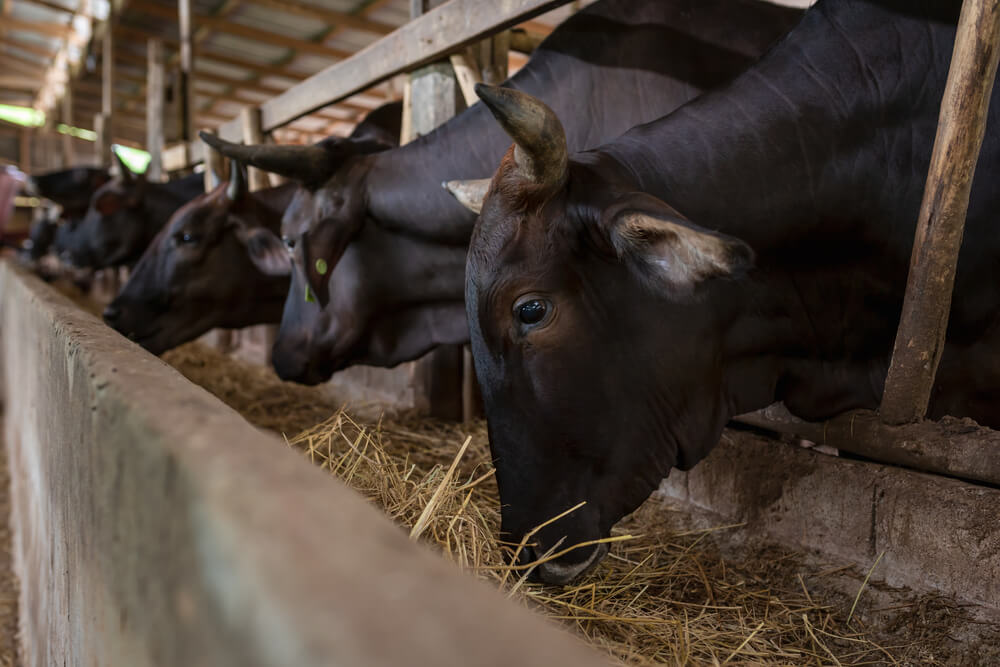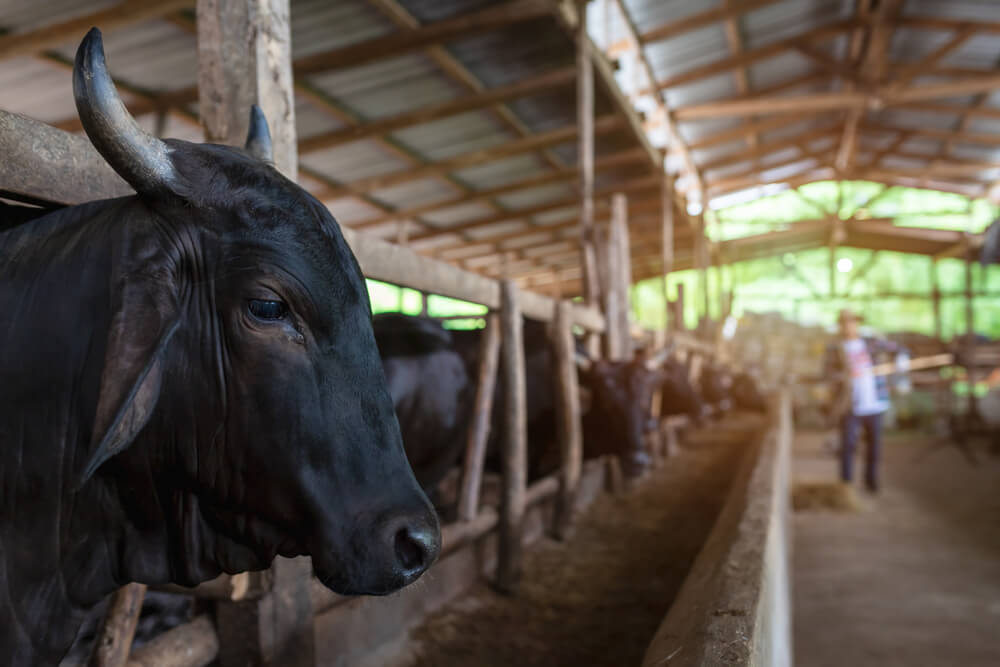Wagyu beef is said to be superior to all other types of beef on earth, and there’s a good reason for that! The raising of Wagyu beef cattle differs tremendously from the raising of any other sort of cattle. In this article, we discuss the ins and outs of raising Wagyu cattle. Read on to learn more.
What You'll Learn Today
- What’s Different About Wagyu Beef?
- What Are Wagyu Cattle?
- How Did Wagyu Cattle Originate?
- Wagyu Cattle Are Bred And Raised With Care
- How Much Better Is Wagyu Steak?
- Is Wagyu Beef Good For You?
- Can Wagyu Cattle Be Raised In America?
- Raising Wagyu Is A Different Kind Of Cattle Ranching
- Wagyu Raising Is Relatively Earth Friendly
- Wagyu Is The Meat Of The Future
- Frequently Asked Questions
What’s Different About Wagyu Beef?
This type of beef is exceptionally well marbled and extremely tender. Many people describe it as “melt in your mouth” tender. In fact, Wagyu beef is so tender that you can usually cut it using the side of your spoon!
What Are Wagyu Cattle?

Wagyu is a term that refers to several different types of Japanese cattle. They are:
- Black
- Brown
- Polled
- Shorthorn
Japanese black Wagyu cattle are usually the source of the limited amount of beef that is shipped to the United States.
How Did Wagyu Cattle Originate?
All of these Japanese cattle descended from draft cattle which were used to haul lumber and pull heavy loads. Because of this hard work and the force of evolution, the Wagyu cattle of today have bodies that are adapted to heavy labor.
They typically store a great deal of fat in their muscle tissue because this provides energy at a steady, constant rate which can be used during extended heavy work.
Intramuscular fat (marbling) provides tremendous tenderness, juiciness and flavor, but this physical difference is not the only thing that makes Wagyu beef superior to all other beef. Wagyu cattle are also raised very differently than American beef cattle.
Wagyu Cattle Are Bred And Raised With Care
In Japan, the Wagyu cattle which have the best genetics, as determined through extensive progeny testing, are the only ones allowed to breed.
Breeding of Wagyu cattle is subject to strict regulation, and the animals and process are considered national treasures.
In the United States, most cattle start their lives on pasture and then are fattened in a feedlot to a weight of approximately 1000 pounds. By contrast, Wagyu cattle spend the first year of their lives in small herds at their mothers’ sides.
After the first year, Wagyu yearlings are weaned and sold to small farmers who fatten them and finish them. The finishing process takes over a year (400 days).
During this time, the cattle are extremely well cared for. This attentive care produces happier cattle. These happier cattle produce more well-marbled meat.
To further enhance the quality of the meat, some Wagyu farmers even perform deep tissue massage on their cattle. It is believed that this practice helps to keep the muscles loose and pliable, further enhancing the marbling.
Japan: The Wagyu Mecca
How Much Better Is Wagyu Steak?
Every aspect of Wagyu steak, right down to the aroma, is superior to even the best US produced rib eye. The mouthwatering scent of Wagyu meat comes from the heavy distribution of fatty acids throughout the meat.
The extreme marbling is responsible for the delectable taste and extraordinary tenderness of the meat.
Is Wagyu Beef Good For You?
Wagyu beef is both good and good for you. Monounsaturated fat is known as the “good fat”. The fat found in the marbling has a higher ratio of monounsaturated fat than saturated fat.
Additionally, the saturated fat that is found in Wagyu beef is made up of approximately 40% stearic acid, which typically does not raise cholesterol levels as greatly as other types of saturated fat.
Additionally, Wagyu beef has a higher percentage of the fatty acid, conjugated linoleic acid (CLA) which has few, if any, negative health effects.
It is also believed that eating Wagyu beef can increase your metabolism and energy production, help you maintain your own muscle and improve intramuscular oxygen intake and fat burning ability.
Can Wagyu Cattle Be Raised In America?

Wagyu breeding stock was brought to the United States in 1975, and today there are a few descendants of these cattle in use for breeding in the United States.
In the US, Wagyu cattle are often crossbred with Angus cattle to create a unique and superior meat.
If you want to raise purebred Wagyu, purchasing your original stock can be a heavy outlay.
Purebred, pedigreed Wagyu breeding stock typically costs around three thousand dollars a head. Registered Angus cattle typically cost around two thousand dollars a head.
If you are currently raising Angus cattle or any other type of cattle, or you are thinking of taking up cattle raising, you may wish to consider raising Wagyu cattle.
In fact, you could simply introduce Wagyu blood into your Angus line by taking advantage of artificial insemination services.
Raising Wagyu Is A Different Kind Of Cattle Ranching
Raising cattle in a way that enables them to be healthy, happy and to experience the “cowness of the cow” not only produces tender, well marbled meat, it also does not destroy your soul.
Although raising Wagyu cattle takes quite a bit more time and effort than raising cattle the traditional Western way, it’s important to understand that this type of beef attracts different customers.
For example, you’ll find yourself selling to gourmet restaurants, individuals who are seeking cruelty free meat and other high-end markets.
For this reason, you’ll find that your profits are much greater with Wagyu beef than with traditionally raised Western beef.
Even though it may cost you bit more to get started, in the long run, you will make up your investment and then some.
Not only will you make more for Wagyu meat, you will be able to sell your calves as premium calves. These may be finished out by the purchaser, or used for breeding depending upon the animals’ pedigree.
Seed stock animals, those intended strictly for breeding, are in great demand because there are very few Wagyu cattle available in the United States.
Wagyu Raising Is Relatively Earth Friendly
Gently raising these cattle is also easier on the environment. You can raise Wagyu cattle using a method known as silvopasture, which is a combination of livestock raising and forestry that keeps your animals happy and has a very low impact on the environment.
With this method, you can produce both timber and livestock. Basically, you keep about 40% of your pasture under tree cover. You plant a mixture of shade tolerant grasses and forage for your animals.
Good choices in trees include longleaf pine and loblolly pine. Good choices in forage include crimson clover and Bahia grass.
This combination creates a cooler, more stress-free environment for your animals. It also protects your soil and provides habitat for beneficial wildlife.
Wagyu Is The Meat Of The Future
Today, Americans are more concerned about health than ever before and with good reason.
The type of animal rearing we have done in recent years, involving factory farming and feedlot finishing of cattle is thought to cause problems with antibiotic resistance and infections such as the coronavirus.
It is safe to say that in the years to come Americans will become more and more fastidious in their eating habits. This will naturally increase the market for meat that has been cleanly and humanely raised.
With all the negative impacts we now recognize surrounding factory farming and feedlot meat, there is an increasing demand for humanely raised meat in the United States.
Raising Wagyu cattle may be an excellent way to improve your personal health, increase your income and help you accumulate some good karma!
Those serious about Wagyu breeding can contact the American Wagyu Association.
Frequently Asked Questions

It is actually quite easy to raise these docile, adaptable cattle. They can be raised just as you would any meat cattle, or you can provide the specialized care that greatly enhances the quality of their meat. They are not exotic animals.
These cattle are no more sensitive to cold than other breeds. For all cattle, it is important to provide shelter from the elements and a dry, padded (deep straw or other bedding) area for rest. Being exposed to cold temperatures is stressful for all cattle and will reduce weight gain. Very cold temperatures can be deadly for calves.
Wagyu beef is typically cooked at lower temperatures than other beef so as not to damage its flavor. Typically, Wagyu beef is not seared at high heat, so oil is not needed. Oil should not be used when preparing top grade “A5” Wagyu beef. Australian and American Wagyu can be cooked with low heat oils such as butter, olive oil or vegetable oil.
Wagyu cattle in Japan (i.e. Kobe cattle) are purebred. Those in America and Australia (i.e. America Kobe, Australian Kobe, Kobe style cattle) are crosses. Furthermore, the specialized feeding time is shorter for Wagyu cattle raised outside of Japan. Those raised in Japan are sheltered and milk-fed for the first year of life and receive imported hay and grain for a minimum of 550 days before slaughter. American and Australian Wagyu are milk fed and pasture raised for the first three or four months and receive specialized feeding for three or four hundred days.
It’s best to cook and eat it within forty-eight hours of purchase. If you are not able to do that, you can keep the meat in the freezer for a month without impacting its taste and texture. Package it securely in an airtight container (e.g. zip lock plastic bag with extra air expelled). Place it in the lowest part of the freezer, in the back so that the temperature will not vary every time you open the freezer door. When you are ready to prepare the meat, thaw it in the refrigerator for forty-eight hours. Don’t thaw it in the microwave or in hot water.
Looking for more tips about cattle care? Check out this guide on how to milk your cattle.
I tried Wagnu beef during my summer holiday in Japan a few years ago. I must say it is one of the best dishes I’ve ever eaten in my life.
I have raised beef cattle for 38 years and am very interested in raising Wagu.We have good irrigated pasture.
Under “Can Wagyu cattle be raised in America”, the picture is not a Wagyu. It is a Bos indicus such as Brahma.